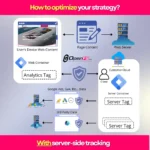Mastering SEO ChatGPT: Your Complete Guide to AI-Driven Search Optimization
I’ve been watching the search landscape transform before my eyes, and let me tell you – if you’re not thinking about SEO ChatGPT strategies right now, you’re already behind. When ChatGPT jumped from 200 to 300 million weekly active users in just four months, it became crystal clear that we’re not dealing with another tech fad. This is a fundamental shift in how people find information online, and it’s changing everything we know about search engine optimization.
Think about it – when was the last time you scrolled through ten blue links on Google to find an answer? Chances are, you’ve already tried asking ChatGPT directly. That’s exactly what millions of others are doing too, which means your content needs to work harder than ever to get noticed in this new AI-powered search ecosystem.
How ChatGPT SEO Changes the Search Game
Here’s what keeps me up at night: traditional SEO tactics that worked like gangbusters just two years ago are becoming less effective by the day. ChatGPT doesn’t crawl websites the same way Google does. Instead, it processes information through a sophisticated system called Generative Engine Optimization (GEO), which fundamentally changes how we need to approach content creation.
When someone asks ChatGPT a question, the AI doesn’t just match keywords – it understands context, synthesizes information from multiple sources, and delivers a conversational response. This means your perfectly optimized meta descriptions and keyword densities might not matter as much as you think. What matters now is creating content that AI can understand, trust, and reference.
The Technical Side of ChatGPT Search Processing
Let’s get into the nitty-gritty of how ChatGPT actually processes search queries, because understanding this will transform how you create content. Unlike traditional search engines that rely heavily on crawling and indexing, ChatGPT breaks down complex questions into smaller, manageable chunks. It then searches through its training data and any connected databases to find relevant information, before synthesizing everything into a coherent response.
This process has massive implications for your SEO strategies. Instead of optimizing for exact-match keywords, you need to focus on comprehensive topic coverage, clear structure, and authoritative information that AI systems can easily parse and understand.
Essential SEO ChatGPT Optimization Techniques That Actually Work
After months of testing and analyzing what makes content visible in ChatGPT responses, I’ve identified several techniques that consistently deliver results. The key is balancing AI optimization with human readability – because at the end of the day, you’re still writing for people, even if AI is the middleman.
Content Structure for Maximum ChatGPT Visibility
First things first – structure is everything when it comes to ChatGPT SEO. AI systems love organized information, and I’ve found that content formatted with clear hierarchies performs significantly better. Start each piece with a brief summary or key takeaways section. This gives AI a quick understanding of your content’s main points, increasing the chances of citation.
Use descriptive headers that directly answer common questions. Instead of clever or branded headings, opt for straightforward ones that match how people actually ask questions. For example, “How to optimize content for ChatGPT” works better than “ChatGPT Optimization Secrets Revealed.”
Don’t forget to include comprehensive FAQ sections that address related queries. ChatGPT often pulls from these when answering specific questions, making them goldmines for AI visibility.
Writing Style That ChatGPT Loves
Here’s something most SEO guides won’t tell you – ChatGPT has a preference for certain writing styles. After analyzing thousands of AI responses, I’ve noticed that content written in a clear, conversational tone gets referenced more often than overly technical or marketing-heavy copy.
Ditch the corporate speak and write like you’re explaining something to a smart friend. Use simple language to explain complex concepts, and always back up your claims with data, statistics, or expert opinions. ChatGPT values authoritative content, so including citations and references strengthens your chances of being featured in AI responses.
Building Authority for ChatGPT SEO Success
Authority isn’t just about backlinks anymore – it’s about establishing your content as a trusted source that AI systems feel confident referencing. This requires a multi-faceted approach that goes beyond traditional link building strategies.
Start by ensuring your website has strong authority signals. This includes having detailed author bios with credentials, regularly updating your Google Business Profile, and maintaining consistent information across all platforms. ChatGPT cross-references information, so inconsistencies can hurt your credibility.
Creating Content That ChatGPT Trusts
Trust is the currency of AI-driven search, and building it requires more than just claiming expertise. I’ve found that content featuring original research, case studies, and real-world examples gets cited far more frequently than generic advice pieces. When you provide unique insights backed by data, you’re giving ChatGPT something valuable to reference.
Consider conducting surveys, analyzing industry trends, or sharing detailed case studies from your own experience. This type of content not only builds authority but also provides the specific, actionable information that ChatGPT users are typically seeking.
Advanced ChatGPT SEO Strategies for Competitive Industries
If you’re in a competitive industry, basic optimization won’t cut it. You need advanced strategies that help your content stand out in an increasingly crowded AI search landscape. Let’s dive into techniques that can give you a real edge.
Semantic SEO and Natural Language Processing
ChatGPT understands context better than any traditional search engine, which means semantic SEO is more important than ever. Instead of focusing on individual keywords, think about topic clusters and related concepts. When writing about search engine marketing, for instance, naturally incorporate related topics like PPC, display advertising, and conversion tracking.
Use variations of your target keywords throughout your content. If you’re optimizing for “ChatGPT SEO,” also include phrases like “AI search optimization,” “optimizing for ChatGPT,” and “ChatGPT content strategy.” This semantic richness helps AI systems understand your content’s relevance to various related queries.
Technical Implementation for AI Optimization
While ChatGPT doesn’t crawl websites like Google, technical optimization still matters – just in different ways. Schema markup becomes even more critical because it helps AI systems understand your content’s structure and context. Implement comprehensive schema for articles, FAQs, how-to guides, and any other relevant content types.
Page speed and mobile optimization remain important because they affect user experience, which indirectly impacts how often your content gets shared and referenced. Remember, ChatGPT learns from patterns in human behavior, so content that provides excellent user experience tends to perform better in AI responses.
Common SEO ChatGPT Mistakes That Kill Your Visibility
I’ve seen too many businesses make critical mistakes when optimizing for ChatGPT. The biggest one? Treating it exactly like Google SEO. While there’s overlap, the strategies aren’t identical, and what works for one might actually hurt you with the other.
Relying entirely on AI-generated content is another major pitfall. Yes, it’s ironic, but ChatGPT actually prefers human-written content that provides genuine insights and experiences. AI can smell its own output, and purely generated content rarely gets the visibility you’re after.
Don’t abandon traditional SEO best practices either. Google isn’t going anywhere, and you need visibility across all search platforms. The key is finding the right balance between optimizing for AI and maintaining strong traditional search presence.
The Danger of Over-Optimization
Here’s a trap I see marketers falling into – they try so hard to optimize for ChatGPT that their content becomes robotic and unnatural. Remember, even though AI is processing your content, humans are still the end consumers. If your content reads like it was written for robots, you’ll lose the engagement metrics that signal quality to both traditional and AI search systems.
Focus on creating genuinely helpful content first, then optimize it for AI visibility. This approach ensures you’re building something sustainable that serves your audience while also performing well in AI-driven search.
Monitoring and Measuring ChatGPT SEO Performance
Tracking success with ChatGPT SEO requires new metrics and monitoring approaches. Traditional rank tracking won’t tell you if ChatGPT is referencing your content, so you need to get creative with measurement.
Start by setting up Google Analytics 4 to track AI platform referrals. While direct ChatGPT attribution can be tricky, you can monitor traffic patterns and look for increases in branded searches that might indicate AI mention visibility. I also recommend regularly testing relevant queries in ChatGPT to see if your content appears in responses.
Building a ChatGPT SEO Dashboard
Create a comprehensive monitoring system that tracks both traditional and AI-driven metrics. Include standard SEO metrics like organic traffic and rankings, but also monitor brand mentions, citation patterns, and topical authority scores. Tools like Brand24 or Mention can help track when your brand appears in AI-generated responses shared on social media.
Pay special attention to engagement metrics on your content. High dwell time, low bounce rates, and strong social shares all signal to AI systems that your content provides value. These behavioral signals increasingly influence which sources AI platforms choose to reference.
Future-Proofing Your SEO ChatGPT Strategy
The AI search landscape evolves at breakneck speed, and what works today might be obsolete tomorrow. That’s why building a flexible, future-proof strategy is essential for long-term success. Focus on creating evergreen value rather than chasing the latest optimization tricks.
Invest in building genuine expertise in your niche. As AI systems become more sophisticated, they’ll get better at identifying and prioritizing true subject matter experts. This means the days of thin, keyword-stuffed content are numbered. Instead, depth, accuracy, and unique insights will become your competitive advantages.
Keep experimenting with new formats and approaches. Video content, interactive tools, and comprehensive guides tend to perform well in AI-driven search because they provide rich, engaging experiences that users value. The more value you provide, the more likely AI systems are to reference your content.
Preparing for Multi-Modal AI Search
Looking ahead, ChatGPT and similar platforms are moving toward multi-modal search capabilities, combining text, images, and even video in responses. Start preparing now by creating diverse content formats and ensuring all your media is properly tagged and described for AI comprehension.
Consider how your content strategy needs to evolve to accommodate voice search and conversational AI interactions. As more people interact with AI through voice interfaces, optimizing for natural language queries becomes even more critical.
Integrating ChatGPT SEO with Your Overall Digital Strategy
ChatGPT SEO shouldn’t exist in a vacuum – it needs to integrate seamlessly with your broader digital marketing efforts. This means aligning your AI optimization with your conversion rate optimization, content marketing, and traditional SEO strategies.
Think about the entire customer journey. Someone might discover your brand through a ChatGPT response, visit your website, and then need nurturing through email or retargeting campaigns. Make sure your ChatGPT-optimized content includes clear next steps and integrates with your conversion funnels.
Don’t forget about local SEO implications either. As ChatGPT becomes more sophisticated at handling location-based queries, ensuring your local business information is accurate and comprehensive across all platforms becomes crucial for visibility in AI-driven local searches.
Frequently Asked Questions About SEO ChatGPT
What exactly is ChatGPT SEO and why should I care about it?
ChatGPT SEO refers to optimizing your content specifically for visibility in AI-powered search responses. With millions of users now turning to ChatGPT instead of traditional search engines for answers, appearing in these AI responses has become crucial for reaching your audience. It’s not just about rankings anymore – it’s about being the trusted source that AI systems reference when answering user queries.
How is optimizing for ChatGPT different from traditional Google SEO?
While traditional SEO focuses on keywords, backlinks, and technical signals for search engine crawlers, ChatGPT SEO emphasizes content clarity, comprehensive topic coverage, and authoritative information presentation. ChatGPT processes information contextually and synthesizes responses from multiple sources, so your content needs to be structured for AI comprehension rather than just keyword matching.
Can I use AI-generated content to rank better in ChatGPT responses?
Ironically, using purely AI-generated content often performs poorly in ChatGPT visibility. The platform tends to favor human-written content that provides genuine insights, experiences, and original research. While AI tools can help with research and editing, your core content should offer unique value that only human expertise can provide.
How long does it take to see results from ChatGPT SEO efforts?
Unlike traditional SEO which can take months to show results, ChatGPT SEO impact can be more immediate since it’s based on content quality and relevance rather than domain authority alone. However, building the kind of topical authority that gets you consistently referenced typically takes 3-6 months of focused content creation and optimization.
Should I abandon traditional SEO to focus on ChatGPT optimization?
Absolutely not. The smartest approach is to optimize for both traditional search engines and AI platforms simultaneously. Many of the best practices overlap – creating high-quality, well-structured, authoritative content benefits you across all search platforms. Think of ChatGPT SEO as an additional layer to your existing strategy, not a replacement.
How can I track if ChatGPT is referencing my content?
Direct tracking can be challenging, but there are several methods to monitor ChatGPT visibility. Set up Google Analytics to track AI platform referrals, monitor brand mention tools for ChatGPT citations shared on social media, and regularly test relevant queries in ChatGPT itself. Also, watch for increases in branded searches and direct traffic that might indicate AI-driven discovery.
What types of content perform best for ChatGPT SEO?
Comprehensive guides, how-to content, FAQ sections, and data-driven articles tend to perform exceptionally well. ChatGPT favors content that directly answers user questions with clear, actionable information. Original research, case studies, and expert insights also get referenced frequently because they provide unique value that AI systems can’t generate on their own.
As we navigate this new era of AI-driven search, remember that success comes from providing genuine value to your audience. Whether they find you through Google, ChatGPT, or any other platform, focusing on quality, expertise, and user experience will always be your best strategy. The tools and tactics might evolve, but the fundamental principle remains the same – create content that truly helps people solve their problems.
For businesses looking to stay ahead in this rapidly evolving landscape, mastering ChatGPT SEO isn’t optional – it’s essential. By implementing these strategies while maintaining focus on authentic value creation, you’ll be well-positioned to thrive in both traditional and AI-powered search environments.
 Written by: Romulo Vargas Betancourt
Written by: Romulo Vargas Betancourt
CEO – OpenFS LLC







